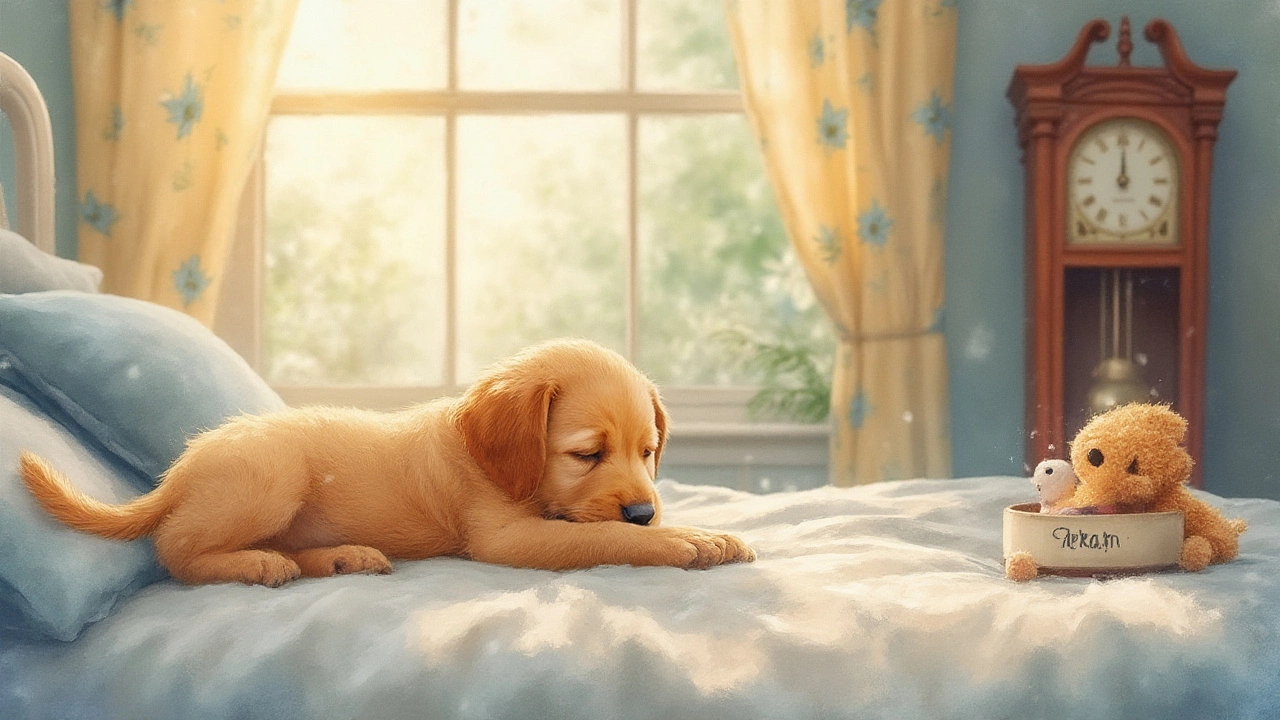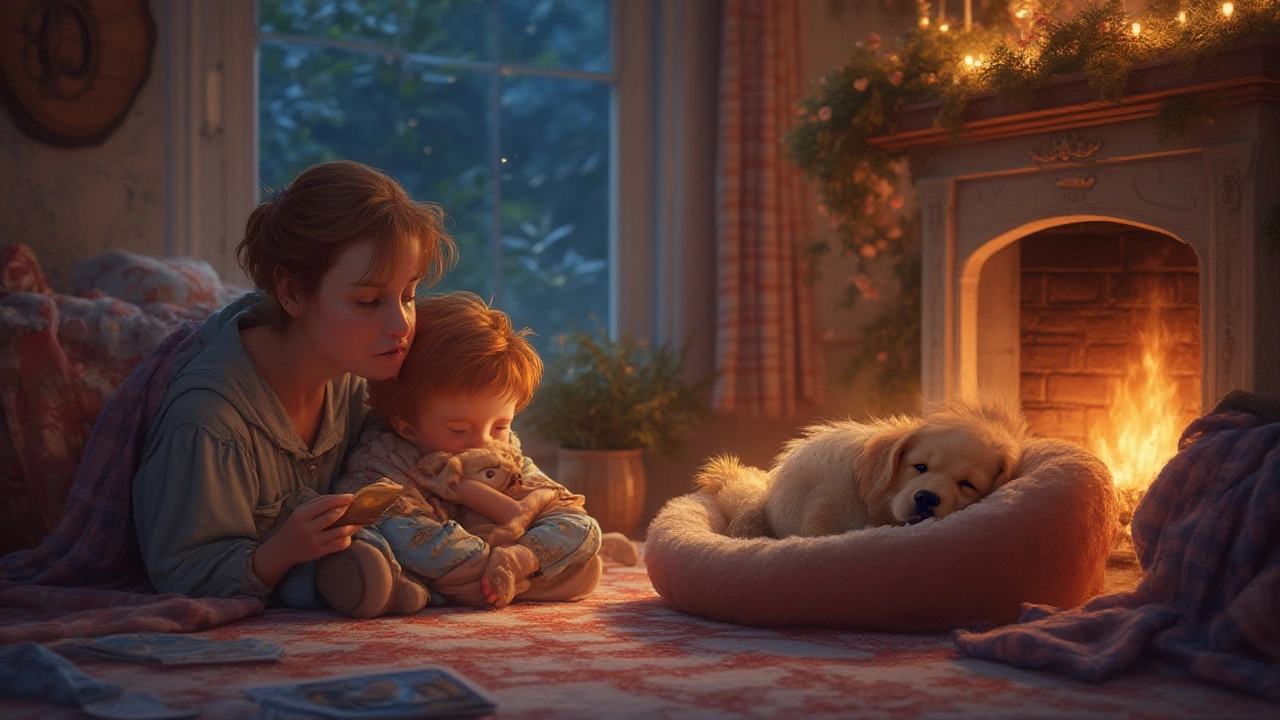Your puppy isn’t just cute when he yawns at 7pm and slides into his bed—he’s actually showing you an important clue. Puppies sleep a lot, and the wrong bedtime can mean chaos for both of you. Sleep will shape your puppy’s mood, health, and even how fast he learns commands—so getting his night routine right isn’t a pet-parent luxury; it’s totally necessary.
How Much Sleep Does a Puppy Need?
Ask any new puppy owner about their experience and you’ll hear about endless naps, flopping on floors, and snoozing in odd places. That’s because puppies (up to about six months old) need a mind-blowing 18-20 hours of sleep every 24-hour day. It’s not laziness; their bodies and brains are under construction—this is hardcore growing time. Veterinarians and researchers agree: too little sleep can make puppies crabby, reduce their ability to learn, and even weaken their immune systems. That’s why big changes in sleep habits—like skipping naps or wildly different bedtimes—can mess up their development.
Nighttime sleep is the glue that holds all the daily napping together: puppies thrive with structure, especially overnight. While adult dogs might get by on 12-14 hours, your young pup needs full nights plus lots of daytime dozing. That’s why setting an actual bedtime makes life easier for both of you. If your goal is a happy, trainable, and healthy companion (and let’s be honest, if you don’t enjoy being woken up at 2am), respecting these numbers is key.
| Puppy Age | Sleep Needed per 24h | Daytime Naps |
|---|---|---|
| 8-12 weeks | 18-20 hours | 4-8 naps |
| 3-6 months | 16-18 hours | 2-4 naps |
| 6-12 months | 14-16 hours | 1-2 naps |
Puppies who don’t get enough sleep can show signs of restlessness, hyperactivity, or even seem "aggressive," when really, they’re just overtired—think toddler meltdowns but with more teeth. Giving your pup enough actual down time calms their nervous system, helps them process the day, and keeps their growth on track. So yes, that bedtime isn’t just for you: it could make the difference between chaos and calm, both now and later.
What Time Should Your Puppy Go to Bed?
The short answer? Somewhere between 8pm and 10pm is perfect for most puppies. Why this window? It lines up with the natural rhythms of most homes and gives your puppy enough rest before the day starts again. Puppies wake up with the sun—so if you want to avoid early-morning howls, syncing bedtime with your own sleep is smart. Nighttime accidents are less likely when a puppy is well-rested, and both your nerves and your floors will thank you.
Every breed and every dog is a little different, of course. Tiny breeds (think Chihuahuas) may tire out earlier and sleep longer stretches, while working breeds like Border Collies might need a little more help winding down (all that brainpower needs to chill out). Age matters too: an eight-week-old is basically a snooze machine, but by five months you’ll probably notice longer wake times. Still, the "8-10pm" window works for most—pick a time that fits your daily life and stick to it.
Here’s a simple way to find the right bedtime: count backward from when your puppy naturally wakes up. If he’s always barking at 6am, aim for 9pm as your regular lights-out. Try to anchor bedtime after a quick potty break and a little bit of calm time—no zoomies right before bed! Puppies who go to bed after wild play often have trouble settling; winding down gradually makes the transition smoother and keeps sleep deep.
Nighttime routines make a big difference. Dimming the lights, quiet music, the smell of a familiar blanket—your puppy is wired to recognize bedtime signals, just like little kids. The more predictable you can be, the better he’ll sleep. If you move bedtime by more than 30 minutes, you might notice fussing, whining, or even accidents. Consistency truly is your new best friend.

Building an Effective Puppy Bedtime Routine
A bedtime isn’t just about picking a number on the clock—it’s about shaping every step your puppy takes before curling up for the night. Regularity turns bedtime into a natural part of life (instead of a nightly battle). Most trainers recommend working backwards from bedtime, building a predictable sequence your puppy starts to recognize:
- Final potty trip (outside when possible, or to a pee pad)
- Switch to quiet activities—gentle petting or a calm chew toy
- Pick up food and water 2-3 hours before bed
- Dim lights and turn off the TV 15-30 minutes before sleep
- Give him something that smells like you or his mom (a blanket, a soft toy)
Here’s a less obvious tip: use scent and softness to anchor bedtime. Puppies are comforted by familiar smells. A blanket you’ve hugged or a shirt you wore can work wonders, especially if he’s new to your home. Some owners like to use a white noise machine or soft music—surprisingly, studies show puppies fall asleep faster and stay asleep longer with gentle background noise that blocks out street sounds or household creaks.
Location matters just as much as routine. Lots of pups do best in a crate near your bed. Why? They can smell and hear you, which reduces nighttime anxiety and helps them settle. As he gets older and gains bladder control, you can move the crate further away if you want. Avoid letting your puppy sleep in a different spot each night, since hopping from couch to crate to bed is more stressful than comforting.
Bored with bedtime battles? Puppies who resist sleep late into the night usually need more daytime action—not more midnight attention! Make sure he’s had physical activity and mental enrichment (like scent games or food puzzles) throughout the day. Overtired puppies act wired, but what they really need is help winding down—not more play. Your calm voice, dim lights, and relaxed energy help your pup slip into sleep mode.
Real-Life Solutions for Common Puppy Sleep Problems
Even with the best plans, you’ll hit bumps in the road. Middle-of-the-night barking, accidents, and 5am wakeup calls can make even the chillest dog-lover question their sanity. Why does this happen? Usually, it’s either too much stimulation before bed, an unpredictable schedule, hunger, or a puppy who needs a potty break (or reassurance).
If your puppy wakes up whining at midnight, resist the urge to reward that with food or play. Quietly take him out for a potty break (no talking or games), then straight back to bed. If you talk or play, you teach him to wake you every night for fun. Most pups drop these wakeups within a week or two if you stick with boring potty-only responses.
Sudden, frantic barking? Anxiety peaks at night, especially for new puppies. Don’t scold or yell; reassure with your calm presence. Some puppies sleep so soundly they have accidents without realizing. If this is happening, try a late-night "dream pee"—carry him out gently around midnight and let him go one more time. Over weeks, his bladder control will improve—just be patient, and don’t push him to “hold it” longer than he can handle (especially if he’s under 16 weeks old).
For early risers, first ask: does the sun hit his sleeping spot early? If yes, blackout curtains often fix the problem. If not, consider a feeder toy that dispenses part of his breakfast at the right time, or just ignore wakeup whines until your chosen wakeup time. Reward calm, quiet morning behavior—it works faster than punishing noisy early birds.
If your *puppy sleep schedule* is still a mess after a few weeks, ask your vet. Puppies who can’t settle may have discomfort, an undiagnosed medical problem, or might benefit from gentle melatonin (but only under a vet’s guidance—not all supplements are safe for dogs, and doses must be precise).
The first months are a sleep-deprived blur—but bedtime success pays off for years. Dogs raised with good sleep hygiene become easier to train, less anxious, and better family companions. The best gift you can give your puppy? A calm, predictable, early bedtime—and the routines that make it stick. Happy sleeping!
